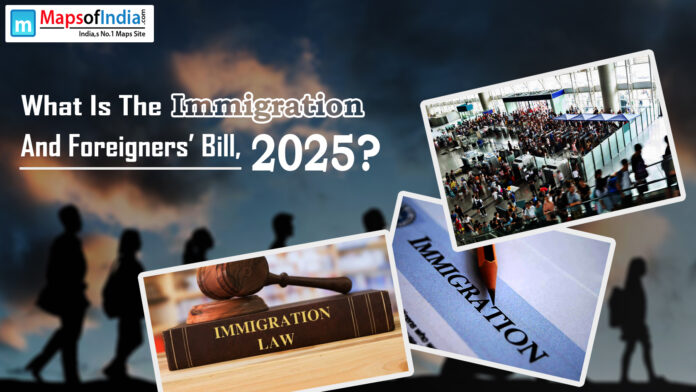To fortify India’s borders and simplify the Immigration and Foreigners laws, the Union government presented the Immigration and Foreigners Bill, 2025 last week in the Lok Sabha. The Passport (Entry into India) Act of 1920, the Registration of Foreigners Act of 1939, and the Foreigners Act of 1936 are three pre-independence laws which are replaced and repealed by the Immigration (Carriers’ Liability) Act of 2000. While introducing the bill, Minister of State (MoS) Home Affairs Nityanand Rai said, “We are not bringing this law to stop anyone from coming to India”.
The Statement of Objects and Reasons submitted alongside the Bill mentions that the Acts “are not only of the pre-Constitution period, but also, they were brought into extraordinary times of first and second world wars”. It also highlights the requirement for comprehensive law and the existence of overlapping rules.
The new bill would give the central government the authority to regulate foreigners. It also mandates that passports or other travel papers be obtained by anybody who is entering or departing India. According to the Immigration and Foreigners Bill, 2025’s Statement of Objects and Reasons, the proposed law addresses several immigration-related issues, including the duties of immigration agents, the need for passports and visas, and other things. The measure would outline issues about foreigners and their registration, as well as the role that hospitals, colleges, and other medical facilities play in admitting foreign people.
Key Aspects of the Bill
The Bill suggests building a Bureau of Immigration, led by a commissioner and backed by several immigration agents. According to the duties outlined by the Center, the Bureau shall operate under the administration of the central government and be in charge of managing the admission and departure of foreign nationals. Section 7 of the Bill provides the Center Board authority to regulate foreign national travel and activities within India. Among these are as follows:
Foreign citizens would have to register when they arrive in India under the new bill. Other rules consist of:
- Mobility restrictions inside India, including the prohibition of entering protected and restricted places without prior authorisation.
- Restricting identity changes and name changes.
- Nursing homes, hospitals, and educational institutions will have to report the presence of foreign nationals to immigration officials.
Punishments under Immigration and Foreigners Bill, 2025
- Foreigners who enter India without proper documentation risk a punishment of up to ₹5 lakh and five years in jail.
- A minimum sentence of two years in prison, with the possibility of a seven-year sentence, and a fine of ₹1 lakh to ₹10 lakh might be imposed for using fake travel papers. Hospitals and educational institutions are required to provide authorised registration officials with information on international patients and pupils.
- Foreigners who outstay on their visa or violate the rules may be jailed for up to three years, fined up to ₹3 lakh or both. If transport companies (ships, airplanes, are caught transporting foreigners without proper documentation, they may be penalised up to ₹5 lakh. The transport vehicle may be seized or put behind bars if the fine is not paid.
The Bill gives the central government the power to control or limit foreigners’ ability to enter, leave, and travel. Foreigners may be asked to pay for their departure, register using biometrics, or stay away from particular locations.
Airlines, shipping firms, and other transportation providers are subject to a great deal of accountability under the measure. Important clauses consist of: Carriers that carry foreign nationals without proper documentation risk a fine of up to ₹5 lakh. The carrier shall be liable for the prompt deportation of any foreign individual who is refused entrance into India.
If fines are not paid, the transport vehicle may be seized for non-compliance. Similarly, foreign nationals are required to have a valid visa, although section 33 or intergovernmental agreements exempt them from this need while they are in India.
Benefits of Immigration and Foreigners Bill, 2025
- Increased National Security enhances border control to stop dangers to security and illegal entrance.
- A simplified Legal governance framework takes the place of several statutes.
- Better Handling of Immigration centralised systems for reporting alien nationals and tracking visas.
- Boosts tourism and business which guarantees a methodical strategy to attract foreign visitors, which will increase capital.
Criticisms
Congress leader Manish Tewari argued in his Lok Sabha rebuttal that the provisions allowing the government to restrict foreign entry had the “potential to be misused if any government of the day feels that the political views or ideological beliefs of any individual or…dissenter are not conformist in nature with the disposition of the current establishment.” He said that this was against Article 14 of the Constitution, which states that “any person,” including foreigners, is entitled to equality before the law and equal protection under the law.




